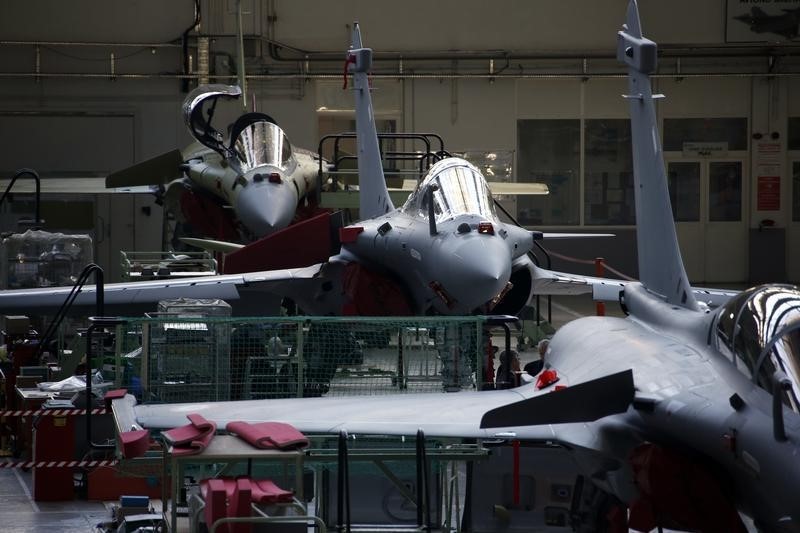Street Calls of the Week
Investing.com -- Dassault Aviation's (EPA:AM) Rafale fighter jet deliveries for 2024 exceeded expectations, sending its shares up over 3% on Wednesday.
A total of 21 Rafale jets were delivered during the year, one unit higher than the company's guidance and representing a 62% year-on-year increase, as per figures released by the group.
The breakdown includes 14 jets for France and seven for export markets, bolstered by the fulfillment of delayed deliveries from 2023.
Analysts at Morgan Stanley (NYSE:MS) said that this performance supports Dassault's ability to meet its sales target for the year despite challenges in other segments.
On the civilian side, the Falcon business jet segment delivered a more subdued performance. Falcon deliveries totaled 31 units, four below guidance, highlighting ongoing supply chain constraints.
While deliveries were modestly higher year-on-year, the miss was largely anticipated given persistent industry-wide pressures.
Despite these headwinds, Falcon orders edged up slightly, reaching 26 units for the year—an increase of 13% compared to the prior year.
However, with a book-to-bill ratio below 1x for the second consecutive year and only 79 units in the backlog, analysts expressed concerns about potential downside risks to future delivery forecasts.
The Rafale programme continues to be a bright spot for Dassault. Order intake for Rafale jets remained robust at 30 units, all destined for export markets, including 18 for Indonesia and 12 for Serbia.
As a result of this strong performance, the programme's book-to-bill ratio is 1.4x in unit terms. Currently, Rafale production has visibility of over 10 years at current delivery rates, as the backlog stands at 220 units.
Further upside is anticipated in the near term as a 26-jet order from India, initially agreed upon in late 2023, and ongoing negotiations with other countries like Saudi Arabia are anticipated to determine whether the agreement can be finalized.
While Dassault’s defense division remains firmly positioned, the outlook for the Falcon business jet segment remains clouded by uncertainty.
Morgan Stanley analysts observed that the demand environment for business jets remains weak, with only 79 units in the Falcon backlog, equivalent to 2.3 years of coverage based on 2024 delivery guidance.
They added that the risk of delivery shortfalls between 2025 and 2027 remains elevated, given Dassault’s recent struggles with market share loss and challenges in executing its development programmes, such as the Falcon 10X.
Despite the smaller relative contribution of Falcon to Dassault’s overall business—roughly 33% of sales and 25-30% of operating profit on average between 2025 and 2027—the segment has historically been a key driver of investor sentiment due to high investment levels and strategic importance.
Analysts at Morgan Stanley emphasized that the additional Rafale delivery largely offsets the revenue impact of missed Falcon deliveries.
Going forward, they remain cautious on the Falcon segment but see potential upside risks for the group as a whole, particularly if macroeconomic conditions improve and Dassault succeeds in securing additional fighter jet orders.
While risks to the downside include continued weakness in Falcon orders and potential delays in key development programmes, the analysts flagged several upside catalysts.
These include further Rafale orders from key markets like India and Indonesia, as well as improvements in the business jet market driven by new product launches such as the Falcon 6X and 10X.
